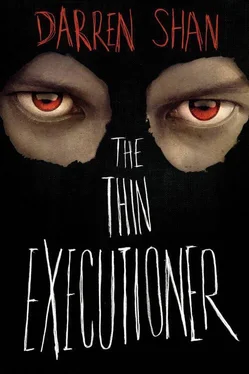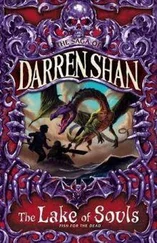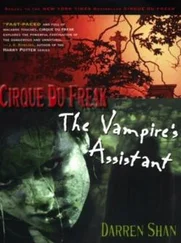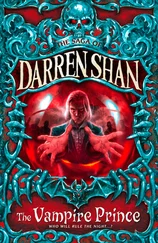It was a long tale, and by the end everybody was weeping, Murasa, the children, and Jebel. It never crossed Murasa’s mind that Jebel might be lying — he spoke in the simple tones of one who was telling the unadorned truth.
“You are not the boy I met a year ago,” she said when she finally could speak.
“No,” Jebel sighed. “I’ve changed. It’s probably for the worse — I’m sure the gods will curse me for my weakness — but even so, I wish it had happened earlier. Maybe I could have saved…” He trailed off into silence, then told Murasa to get ready. “I’m anxious to settle this. You won’t spend one more night as slaves.”
“One night isn’t much,” Murasa said.
Jebel shook his head, recalling his treatment at the hands of Bush and Blair, and the Um Biyara. “One night of slavery is too much.”
Murasa nodded, then turned to her children and told them to fetch anything they wanted to bring — they were leaving this wretched place in a few minutes and never coming back.
*
There was great excitement at the palace when Jebel turned up. Rashed Rum had entered with J’An a couple of hours earlier and requested an audience with the high lord. Wadi Alg swiftly appeared, flustered, wondering what had prompted the unexpected visit. When Rashed Rum said that his youngest son had returned from his quest and was demanding freedom for the wife and children of the slave he’d sacrificed, Wadi Alg didn’t know what the executioner was talking about. His wife, Danafah, had to quietly remind him of the thin boy he had sent on his way the year before.
They were all waiting for Jebel when he arrived, his father and brothers, Wadi and Danafah Alg, the officials responsible for the deeds of slavery, and as many more as could squeeze into the chamber. Debbat Alg was there too, along with Bastina. Neither girl could believe that Jebel had come back victorious. Bastina was afraid he’d be humiliated and executed. Debbat suspected the same thing, but she was looking forward to it — she had no time for deceiful little boys who pretended to be heroes.
All talking ceased when Jebel and the slaves entered. They marched to the table of the high lord, and Jebel bowed respectfully. “Sire,” he said.
“Welcome, master Rum,” Wadi Alg replied with a tight smile. “It’s been some time since you were last before me. Have you kept well?”
“I survived, sire,” Jebel answered neutrally. “And I have come to seek freedom for Murasa and her children, as agreed when you sanctioned my quest.”
The high lord cleared his throat. He didn’t want to openly question Jebel in front of the boy’s father, but he had to. Phrasing his words carefully, he said, “That deal was only valid if you completed your quest or died on the path, not if you returned unsuccessfully.”
“But I have completed the quest,” Jebel said.
Wadi Alg frowned. “You’ve been to Tubaygat? You petitioned Sabbah Eid? You sacrificed the slave and were granted invincibility?”
Jebel looked at the high lord and said, “I am not a liar, sire. I will undertake any test you deem necessary.”
Wadi Alg didn’t know how to respond. Before he could think of something, Rashed Rum said softly, “My son’s oath is mine, my lord. If you doubt his word, you doubt mine too.”
“No!” Wadi Alg gasped. “I didn’t mean to insult you ! I just…”
“My husband doesn’t doubt your son,” Danafah interjected smoothly, as her husband floundered. “But a test is customary, I believe.”
“With respect, my lady, it is not,” somebody else replied, and Jebel caught sight of J’An Nasrim pushing forward. The worldly traveler winked rakishly at Jebel before facing the high lord and lady. “No quester has ever been asked to undertake a test. One cannot pretend to be invincible. Those who return and claim success are always greeted without suspicion. If, later, it should prove to be a lie, the liar can expect a grisly, painful, protracted execution. But if you demand a test at this point, you will set a new, unsavory, and belittling precedent.”
Even though J’An Nasrim was not thought of highly in Wadi, there were murmurs of agreement all around. Most of those present were sure that the boy was lying, but this was not the time or place to question his honor.
Wadi Alg coughed and said, “We will, of course, take you at your word. The slaves will be freed tonight.” He paused craftily. “As I recollect, you undertook the quest in order to compete in the mukhayret.”
“Yes, my lord,” Jebel said, “but—”
He’d been about to say that he wasn’t interested in becoming the executioner now, but Wadi Alg interrupted. “Very good. We look forward to watching you compete. It will be most invigorating to follow the fortunes of a successful quester in action.”
Though the high lord phrased it lightly, his implication was clear. The mukhayret would serve as Jebel’s test. If he beat all other contenders, his word would be accepted and the city would rejoice. If, on the other hand, he declined to compete or was defeated in the competition, it would mean death at the axe of the new executioner.
Jebel spent the three days before the mukhayret at home with his father and brothers. They spent many hours talking about what Rashed Rum, J’Al, and J’An had been up to since Jebel left, but said little about his year in the wilderness. It wasn’t that they weren’t interested in his adventures — they most certainly were! — but none of the three was convinced that Jebel had been to Tubaygat. They felt embarrassed talking about things that were probably pure fantasy. Jebel sensed this and kept his tales of wonder and terror to himself. He understood why they found it hard to accept his word. When he had proved himself, they could discuss his journey. For now it was nice just to chat about their everyday lives.
Many people wanted to visit, but a stern Rashed Rum turned most away. Two of the few he admitted were J’An Nasrim and Bastina — he could tell that both were truly interested in Jebel and not in whether or not he’d seen Sabbah Eid.
Jebel would have happily told J’An Nasrim about his trip, but the traveler didn’t ask many questions except to inquire as to the fate of Tel Hesani. Jebel told him as much as he could about the Um Kheshabah, of his bravery and loyalty, and J’An Nasrim went away proud of his old, lost friend.
Jebel also talked of his quest with Bastina, who turned up shaking a hand filled with three silver coins at him. He had forgotten all about the coins that he had given to her just prior to setting off on his quest.
“I decided to spend them on a memorial stone for you,” Bastina said, pocketing the coins again.
“But I’ve come back alive,” Jebel said, pointing out the obvious.
“Yes,” Bastina smirked. “But you have to die one day. I’m happy to wait.”
Unlike his father and brothers, Bastina believed him implicitly. Jebel enjoyed telling the sad-faced girl his story. She listened quietly, prompting him only when she required more details, such as when he was trying to describe the colors of the siq or the movements of the rock spirits. When he told her about his meeting with Rakhebt Wadak, she shivered deliciously, knowing the story would fuel her nightmares for months to come.
Jebel asked about Debbat Alg a couple of times. Had she said anything about him? Was she excited by his return? Bastina didn’t want to get sidetracked talking about her mistress, but she could see how keen Jebel was for news.
“Yes, she’s excited,” Bastina muttered. “She doesn’t believe that you completed your quest, but she hopes you did. The thought of being married to an invincible executioner appeals to her. She will be a most appreciative wife.”
Читать дальше







